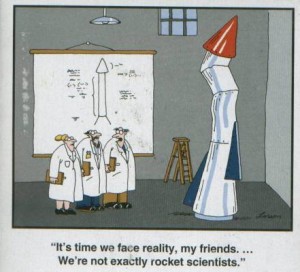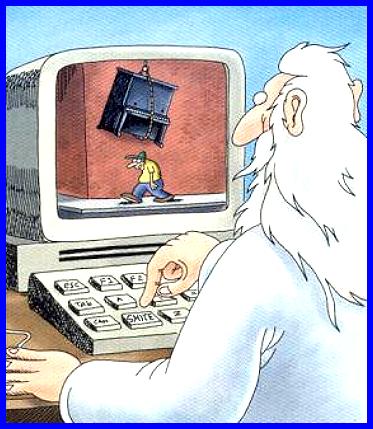It seems predictive posts are all the rage right now so in my own mad style, I’ve taken a look at the tea leaves in order to share some “Sensei-riffic” (trademarking in the works) predictions for marketing, social, and the relationship between customers and brands. So rather than give you the usual obvious predictions, I am going to take a step towards the ledge and peer into the darkness. The signs I see herald tremendous change that is just off the radar.
So sit back, relax, and prepare to have your liberal marketing senses offended while enjoying or becoming outraged at this rum-nog fueled post! Cheers!
Prediction 1: Social CRM will be a huge failure.
Why? Because you cannot quantify an emotional human relationship no matter how hard you try. The quest to do so has begun anew with sCRM. To be clear its predecessor CRM is about numbers, not people. What other system does that to people? Right! The prison system!
 The same people who created CRM are now pushing sCRM. Same shit, different steaming pile. CRM completely dehumanized the customer by reducing the relationship to math. Next it is horribly lop-sided designed to deliver insight into how to get more money from a customer, not how to build a better, mutually beneficial relationship. Does it actually benefit the customer in any way?
The same people who created CRM are now pushing sCRM. Same shit, different steaming pile. CRM completely dehumanized the customer by reducing the relationship to math. Next it is horribly lop-sided designed to deliver insight into how to get more money from a customer, not how to build a better, mutually beneficial relationship. Does it actually benefit the customer in any way?
Maybe we should call it CWM (Customer Wallet Management), how about CMM (Customer Money Management) or even CDM (Customer Decision Management) because it has nothing to do with actual customer benefit. Call me jaded but every company that has a CRM profile on me uses it to try and get more money from me with no clue on how to actually gain my trust.
Is sCRM the second coming? Not in my books. All we have done is given marketers yet another source to gather data to try and soak more money from our customers without working on the actual customer relationship. Still waiting for a company to actually put the R in CRM or sCRM for that matter.
My prediction, it won’t amount to much and most of the companies offering an sCRM solution will be snapped by bigger CRM players as “just another feature” while the ones that stay on their own will go stale. Its a great idea with the same poor execution that CRM enjoys.
Prediction 2: Customer Loyalty, not Customer Acquisition will Become the Big Social Play for Smart Companies.
The greatest mystery to me is why almost every company (B2b and B2C inclusively) focus social marketing on new customer acquisition. Is it that old human failing that we ignore the ones who love us? That we barely appreciate those in our lives every day? Maybe its casual indifference or perhaps something far more mercenary… Whatever it is, we have been ignoring those most important to us. Maybe we are just too dense to realize we are risking our current relationships for the potential of a couple new ones? Like the man who wakes up one morning to find his wife has left him after years of passive neglect.
I live by some simple rules and one of them is “you dance with the ones that brung ya”. It may be my bumpkin simplicity talking, but the first people we should be investing in are our employees and customers – these are the ones that “brung us to the  dance”. So what happens when you ignore the ones that love you and step out to find others? You make an ass of yourself in the international media, lose your endorsements, your fortune and your game.
dance”. So what happens when you ignore the ones that love you and step out to find others? You make an ass of yourself in the international media, lose your endorsements, your fortune and your game.
Looking at how social networks actually work, I am shocked how many companies remain clueless to the value of social solutions for their customers and employees.
Here is the relationship chain I have identified…
- Happy employees deliver better customer/social experiences.
- These better experiences create happier customers, in turn appreciating employees more.
- Happy customers spend more, are more loyal and will defend your brand.
- Happy customers are in the public social networks where positive brand experiences spread very quickly.
- Happy customers and happy employees are the best brand ambassadors and will actively engage in thousands of conversations in blogs, FaceBook, Twitter and other “traditional” social platforms like kitchen tables, events and cafes.
- The actions of your brand ambassadors attract new customers!! Because everyone who hears the stories wants to be with a company that appreciates them! Go figure.
So why oh why are we focusing on acquisition? As for the execution of a social solution for customers and employees all I can say is make them feel two things: appreciated and exclusive. This is the gas in the social engine.
Do yourself a favor at your next marketing strategy meeting and ask “Are we ignoring the ones who brung us to the dance?” and see where it goes.
My prediction is the next big social play will be private communities for employees and customers; perhaps even allowing them to (god forbid) intermingle. These communities must focus on delivering a positive customer and employee experience to thrive. Don’t be a Tiger.
Prediction 3: The Rise of Social Risk Manager and Social Experience Designer as Specialized Marketing Roles
So now that we have literally millions of so called “Social Media Experts” to set-up our Twitter accounts and FaceBook pages, we need to look at more specialized positions past the technology. My prediction is that two roles will emerge for mid and large size enterprise: A Social Risk Manager and a Social Experience Designer. Let’s throw some lose definitions behind these two roles.
Social Risk Manager: A strategic and tactical position serving to homogenize PR, legal, strategy, and operations into one accountable role. Custodian of the Social Policy and Social Risk Mitigation Strategy, adviser to PR and Social team on risk management techniques/training, and “eye in the sky” on emerging issues/trends that affect the business and the industry. Throw in a healthy does of analysis to continually adapt the strategy too.
Social Experience Designer: Again a strategic and tactical role integrating the brand/communications strategy to ensure a consistently positive customer experience in the social channels. Social has been largely “by the seat of your pants” execution with little strategy or rationale, so this role is meant to make Social make sense to the customer. The social experience is designed to utilize the unique factors of the social channels to build the positive perception of the brand in the same way you would design a retail interior or website.
Prediction 4: The Employee Revolution
One of my first posts ever was about the Relationship Revolution over at www.B2BBloggers.com. So we have seen a customer revolution via Social Media, now I predict a social uprising within the enterprise. Why? One simple powerful goal: Improving the Employee Experience. A couple factors at play here…
- GenY employees are less loyal, so to retain them you need to understand and engage them in different ways.
- An employee experience, much like a customer experience, is based on how you engage with them and the experience you design that must be consistent across the company, but diverse enough to promote individuality – be that cultural, gender, social, tribal, regional, etc…
- Allow employees to socialize on topics other than the company! For the love of Pete, when will we learn that we are not the center of their universe? Let them engage on anything they want and let them know its okay to do so.
- Global competition means keeping talent. Being social with employees let’s you understand emerging needs and issues before they go too far. Plus Social Media has made it way too easy for your employees to get poached; Linked In is crawling with recruiters as is Twitter…
Prediction 5: The Awakening that Social Media is NOT a Big Deal, but Social Relationships ARE
 No I am not trying to grab attention by being a contrarian, but I think many people just don’t understand the real drivers behind the rise of the big social media platforms; that being the rise of social relationships. The basis of every good, long lasting relationship for any human being is communication. Communication or our drive to communicate is like a river… its fluidity is its strength allowing it find the easiest course to continue its way to the ocean. In much the same way human communication is fluid finding the easiest route or channel to enable two or more people to socialize.
No I am not trying to grab attention by being a contrarian, but I think many people just don’t understand the real drivers behind the rise of the big social media platforms; that being the rise of social relationships. The basis of every good, long lasting relationship for any human being is communication. Communication or our drive to communicate is like a river… its fluidity is its strength allowing it find the easiest course to continue its way to the ocean. In much the same way human communication is fluid finding the easiest route or channel to enable two or more people to socialize.
So now let me connect the dots on this prediction. Social Media is both the channel and the technology that enables it. The success of a particular social platform is based on its ability to enable its participants to communicate easily and quickly while delivering small, measurable improvements to enhance the experience. The companies that deliver this technology are madly looking for ways to monetize these channels driven by the fear that the competition will outmaneuver them. They are currently adding layers of complexity not just in the technology and interface, but to the communication process itself. They are also enabling “intrusive” communication from corporations looking to reach the participants.
As the channel becomes more complex and more difficult for simple, uninterrupted social relationships to work, human communication will begin to look for a better channel. Let me be very clear here…
It is the company that invests in the social relationship, not the social media channel, that will achieve long term success. Its what i refer to as a socially dominant brand trait. More here on the struggle for existence and social traits.
Prediction 6: The Real Role for Social Media is Lead Nurturing
In the same way you can’t use one tool to build a house, you can’t use one channel to take a net new prospect and drive that relationship through to a sale; especially in B2B marketing.
Lead Nurturing is the art of the relationship and is a long play. Its the same space in time as that point between the first couple dates and moving in together. It takes investment, patience, understanding and time. Has there ever been a role more suited to Social Media?
My experience leads me to believe this is the advantage in turning quantity of leads into quantity and quality of leads. The big challenge? Marketing and sales must work together for it to work.
Of course, once this realization has sunk in, you can actually begin to target your social at specific audiences and behavioral types – greatly increasing the power of your social marketing to engage and accelerate sales efforts.
Do you have a lead nurturing strategy yet or is your social strategy doing everything for everyone?
Prediction 7: The Rise of Mobile Marketing
This is a big one and is by far the most exciting communication tsunami coming our way. I have always said that when we looked at social marketing, we were looking at the south end of the horse walking north by focusing on web-based social.
Think about it for a minute. All of the emerging nations (Brazil, China, India, Africa, etc) are bypassing laptops/pcs and going straight to mobile. The magnitude of these market behemoths and how global companies market to these unique populations will end some brand empires and give rise to new ones.
Take India as an example, it is it is projected that India will have 1.159 billion mobile subscribers by 2013 effectively passing China as the #1 mobile market in the world.
How does this impact our ability to compete in these markets? Check out  this cool review of Indian and Chinese markets
this cool review of Indian and Chinese markets
If you haven’t started giving serious consideration to the importance of mobile marketing (whether you are B2B or B2C) what exactly are you waiting for?
First movers always, always, always get the market advantage.
Prediction 8: Social ROI Measurement is a Waste of Time
I have watched for about 2 years as marketers focus more and more on measuring customer relationships; social or otherwise. Then it came to me recently… ROI measurement is the equivalent of marketing masturbation – We do it to pleasure ourselves. Don’t get me wrong, we should measure our success along the way, but I have seen this grow into a very unhealthy obsession for many marketers. Is it because we find solace in numbers? Or maybe we can manufacture success in the absence of real proof…
Every time I speak with senior execs it always boils down to one thing: Is what you are doing generating profitable revenue? Its another strong argument for marketing and sales alignment to measure the customer life-cycle from first contact to sale.
It seems to be an inferiority complex we can’t shake as marketers. We constantly try to prove to the rest of the enterprise that we do matter to more than just ourselves. The obsession has to stop. It takes valuable resources away from activities such as lead nurturing that drives profitable revenue and delivers constant touch with a potential customer.
My prediction is that most marketers will continue to go overboard on ROI measurement endlessly because its their comfort zone. We will continue to measure things that don’t matter and report on things that have no bearing to the bottom line.
The marketers that can align with sales and keep delivering simple, bottom line-focused analysis will win the day.
Prediction 9: The Beginning of the Great Social Mergers
You can almost feel it in the air. Some big mergers are coming. There are some real hungry large companies out there looking to get into the social scene in a big way. Meanwhile we have some high potential targets that are not big enough to survive on their own for an extended period, but not small enough to die out quickly.
The Hunters: Apple, MSN, Google and FaceBook.
The Prey: Four Square, MySpace, Twitter, Second Life and a dozen smaller social platforms.
The Dark Horses: Linked In and Skype and other indirect social platforms like Ebay/Kijiji and CraigsList.
Apple: Apple needs a viable social platform past its devices. I don’t know that Ping has any merit for them, but a social platform like MySpace makes a great fit to continue to dominate consumer demand for music. Four Square might be of interest as well as this geo-social application gives Apple reach into retailers and their quest for mobile marketing dominance on the iPhone and iPad. Of course this all depends on whether Jobs can get over himself…
FaceBook: Is Facebook reaching the point where an acquisition of a smaller, niche player makes sense? Maybe an acquisition to build out its business offering? This is where I see something like Second Life really giving huge depth to Facebook for both consumers and business. Skype would be a very cool addition to the consumer side giving the ability for real “face time” via video. Lastly, buying out Zynga might be an excellent strategic move as well, but the relationship is dodgey already. Social gaming is a huge part of FaceBook’s future to be sure.
MSN: MSN needs a better social footprint for sure. Bing is not a social platform and their deal with FaceBook is simply a strategic alliance. They need to get into the scene. For them Twitter, Linked In and Four Square make excellent targets and integrate well with their business and consumer offerings. With Windows on mobile devices now, perhaps a stronger relationship with FaceBook is in the works. Who knows.
Google: Google is a fascinating and dangerous company in my mind. They already own You Tube, Buzz is a failure, and its easier to acquire a smaller player than try to risk failure again with an in-house project. I really see Twitter being a nice fit with Google. Its adds great depth and power to Google’s already dominant search and would really put Bing on its heels. Any of the Dark Horses like Skype, Ebay/Kijiji or CraigsList would also be a very interesting for Google to expand/consolidate its reach.
Prediction 10: No One, and I Mean No One, Understands What Influence is or How to Measure it.
If there is one thing Klout and Fast Company’s Influence Project showed us its that no company understands human influence at all. Let’s be honest with ourselves… number of Tweets/followers does not an influencer make. But this hasn’t stopped the bandwagoners from jumping on it early as a possible solution- how many bot owners do you think take advantage of Klout Klub in Vegas?
To me, Klout is an ingenious social game that uses heavy game mechanics to feed two human addictions: acquiring prestige and competing vs. friends/peers. The result? A compulsive need to constantly check and improve your score by ramping up your Tweets to an obnoxious level fueled by a fear of being beaten by a friend or peer.
For such a simple word, Influence is potentially one of the most complex human conditions that exists today. I lamented this complexity recently…. To me, everybody has an “InQ” or Influence Quotient; that is the first layer of Influence complexity, but that is the simplest thing to understand and what Klout and Fast Company based their rudimentary assumptions on. But your InQ is affected by dozens of other layers and types of influence that nobody even talks about or gives any credit to; the most powerful of which is Situational Influence – a topic I intend to explore in an upcoming article.
Want to begin to measure influence? How about giving every person a trust rating that is voted on by their friends and peers? Make the trust button come with a string attached which forces the person who hits the button to say WHY they trust that person. FaceBook “Like” is wishy-washy and any bot can have 500 tweets a day with 1500 people, but trust is a serious commitment. Trust is the root of true influence.
So my 10th and final prediction is that Influence measurement is the holy grail and anyone saying they have THE way to measure it is selling you something. Sure, maybe that makes me a Klown, but nobody listens to me anyway, my Klout score is too low…
Thus ends my rambling end to a new beginning in 2011. Enjoy it, become outraged, or whatever you choose to do. I’m cool with it and wish all of you immense success in 2011 and beyond.
Cheers and beers!
Jeff – Sensei






